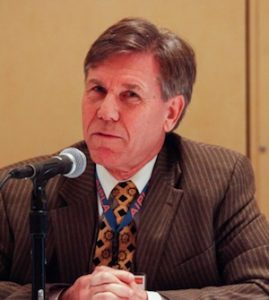In the midst of the Cold War, former CAFC Judge Randall Rader accidently ended up across the border in the Soviet Union. The experience did not dissuade Judge Rader from traveling abroad in the future. Far from it – he has become known for crisscrossing the globe to teach eager audiences about the importance of intellectual property.
Judge Rader recounted the Cold War story to me during a Clause 8 interview that took place the day before the 2016 presidential election (a trailer for the interview is available on YouTube and the full interview is now posted on the Clause 8 website). The accidental crossing happened while he was a missionary in Finland after high school. “I gained an appreciation for other cultures and languages, and it helped me as I went on then into my career,” Judge Rader shared about his time in Finland.
Coincidentally, shortly before my interview with Judge Rader, Tsinghua University announced its plans to appoint Judge Rader to an Honorary Professorship. Tsinghua University is one of China’s leading Universities, and has previously conferred this distinction on several Nobel Prize winners and world leaders. The award not only signified the high esteem for Judge Rader internationally, but provided more evidence of the emphasis that China is placing on improving its patent system. As Judge Rader put it during the interview, “I think there is a real commitment to intellectual property as a path to economic development there.”
There’s still understandable skepticism regarding this view about the People’s Republic of China. At a recent hearing, the Chairman of the House Subcommittee on Courts, Intellectual Property and the Internet scoffed at the idea that China is any kind of beacon for patent rights. However, a study cited during that hearing has found over 1,400 examples of patent applications that were granted in China and Europe but not in the U.S. And, at the same hearing, the Chairman’s own witness confirmed that patent owners are now increasingly looking towards European venues to enforce their patent rights.
Unsurprisingly, Judge Rader is disappointed by these developments. For all his international work, Judge Rader has devoted exponentially more energy to trying to make sure that America’s patent system is the world’s best. During his time on the Federal Circuit, Judge Rader repeatedly spoke about taking steps to make sure that America’s patent system is not at a competitive disadvantage. He “was very enthusiastic about that aspect of the American Invents Act” that harmonized America’s patent system with those of other countries.
Since then, Judge Rader thinks that the situation has only gotten worse overall. “Frankly, there is no country in the world that does what we do here. We have once again, set ourselves on a course which is out of harmony with the rest of the world’s intellectual property standards.”
The consequences of that are clear to Judge Rader: “I can tell you that my work in China and Japan and Korea tells me that the companies there are quite delighted to pick up the slack where American companies don’t have quite the protections that they do under their law.” These concerns about American companies not being able to compete with Asian companies echoed the message that Donald Trump frequently expressed during the presidential campaign.
During the interview, Judge Rader also mentioned “a really excellent paper from a Hoover scholar and it said they had never found an instance of a strong, growing economy that didn’t correlate with a strong protective patent system. And, by the same token, they couldn’t find an instance of a failing economy which was declining in the world market share rather than growing that didn’t correlate with a weak and non-functioning intellectual property system. And, so it’s kind of ironic that we here in the United States are trying to do something history has never done: weaken your patent system while growing your economy.” Here, Judge Rader was providing an explanation for the underwhelming state of America’s economy that Trump frequently criticized during the election.
Therefore, when Donald Trump won the presidential election the day after our interview, Judge Rader’s interest in joining the administration as Director of the U.S. Patent and Trademark Office to “make patents great again” as part of the campaign to “make America great again” seemed quite natural. Although Judge Rader was clearly enjoying his post-Federal Circuit career, he’s not one to shy away from challenges that he believes will help America’s patent system. If anything, improving America’s patent system is probably easier than getting out of the Soviet Union during the Cold War.

![[IPWatchdog Logo]](https://ipwatchdog.com/wp-content/themes/IPWatchdog%20-%202023/assets/images/temp/logo-small@2x.png)


![[Advertisement]](https://ipwatchdog.com/wp-content/uploads/2024/04/Artificial-Intelligence-2024-REPLAY-sidebar-700x500-corrected.jpg)
![[Advertisement]](https://ipwatchdog.com/wp-content/uploads/2024/04/Patent-Litigation-Masters-2024-sidebar-700x500-1.jpg)

![[Advertisement]](https://ipwatchdog.com/wp-content/uploads/2021/12/WEBINAR-336-x-280-px.png)
![[Advertisement]](https://ipwatchdog.com/wp-content/uploads/2021/12/2021-Patent-Practice-on-Demand-recorded-Feb-2021-336-x-280.jpg)
![[Advertisement]](https://ipwatchdog.com/wp-content/uploads/2021/12/Ad-4-The-Invent-Patent-System™.png)






Join the Discussion
7 comments so far.
Night Writer
September 20, 2017 04:41 am@4 continue…
And, you have to understand this within the context of monopolies. Companies like Google will spend money on research as a public good to ward off the anti-trust people, but it means only the big companies with market power are spending on the research.
Eli Mazour
September 20, 2017 01:38 am@Ben Judge Rader expands on this subject (and many more!) during the Clause 8 interview.
Night Writer
September 19, 2017 10:30 pm@3: I think Ben’s questions are good ones. Anyone want to take a crack at answering them?
It is difficult to understand this. Rader once explained this to us in class.
Night Writer
September 19, 2017 10:22 pmHere is a way to think about this. Say there are three stages of developing new products. Basic research. Applied research. Product development. What patents do is make it worth it to put money into applied research. Take away the patents and all the money comes closer to the product development.
I know that would be a good paper and that the facts would support that.
Ben
September 19, 2017 04:02 pm>>“I can tell you that my work in China and Japan and Korea tells me that the companies there are quite delighted to pick up the slack where American companies don’t have quite the protections that they do under their law.”
Are American companies unable to obtain SINO patents? Are Chinese companies receiving USPTO patents which would be denied to American companies? If not, by what mechanism does the American IP system’s relative weakness incentivize non-American companies?
Eli Mazour
September 19, 2017 01:33 pmThanks for reading anon! I definitely think Judge Rader would agree with your last point.
Anon
September 19, 2017 09:42 amA bit of the preacher preaching to the choir, I fear.
I am just not seeing anything compelling to dissuade those who would continue to seek to weaken the US patent system here.
ALL of the points here have been provided in conversations with those vocal people on blogs who clamor for (and celebrate) the weakening of the US patent system.
There are signs that a vested interest simply prevents the points repeated here in this article from entering the cognitive realm of those who do not already recognize the validity of the points.
(and I will further point out and repeat that those who ploy anti-software and anti-business method patent arguments fall into the same group – upon critical review – of those that are simply anti-patent)
A strong patent system is a strong patent system for all forms of innovation.